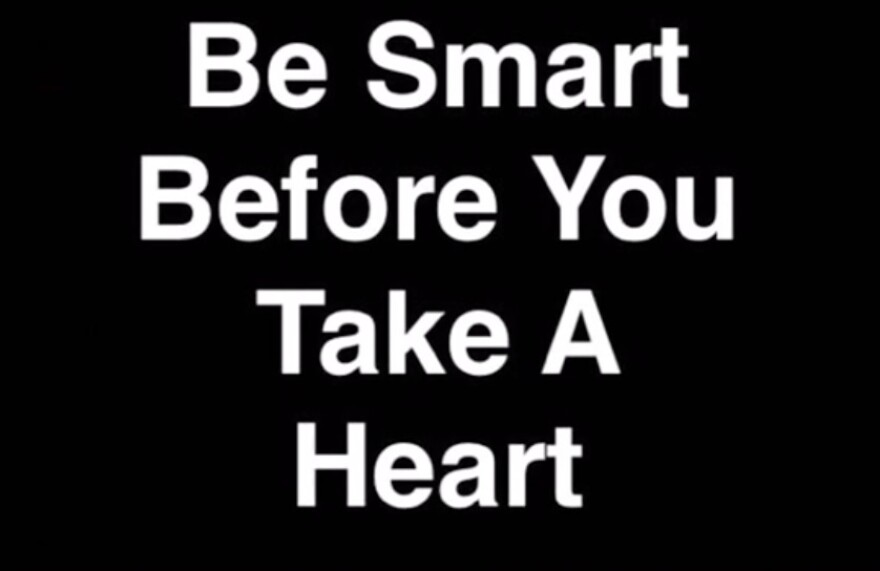Wyoming Senator Anthony Bouchard has had his share of media attention over the last month for a tense exchange with three University of Wyoming students and a professor. The controversy revolves around a class project about how African-American males are stereotyped as dangerous, which Bouchard said was anti-gun and an example of the one-sided approach to the issue he says is pervasive on campus.
Desmin Lewis, Tyrell Proby and Jerard Swan — African-American students in their first year at UW, were presenting their video PSA, for the first time publicly on April 6th at the Shepard Symposium on Social Justice at the University of Wyoming, when Bouchard showedup.
In the PSA you watch two men walk into a gas station. One guy, played by Lewis, uses the ATM but leaves his cellphone behind. The second, played by Swan, sees the phone, grabs it and runs outside.
You see Swan hustles down an alley, in baggy jeans with the hood up on his sweatshirt. Lewis misinterprets why he’s being pursued. It never registers that Swan is trying to return the phone.
Lewis turns, draws a gun and fires. Swan lays dead on the ground.
The PSA closes with the words “Be Smart Before You Take A Heart.”

I wasn’t there for the original presentation, but I caught their spiel about the project at an event called English Matters, where Tyrell Proby explained, “We live in a society that’s driven off stereotypes, and when conceal and carry and stereotypes merge it creates a rise of concern.” And Desmin Lewis chimed in to add that they aren’t even against conceal and carry. “I mean our dads have weapons and we’re all for it. But I believe that a lot of incidents that have happened in the past and throughout history could have been prevented if we had a more strenuous process.”
While they are not anti-gun, they grew up during a time of increased attention to shootings of unarmed black men, like Trayvon Martin. And they’ve had their own experiences being treated with suspicion. Tyrell Proby, who grew up in Cheyenne, said, “Just being from Wyoming a lot of people don’t see a lot of Black people around so when they aren’t used to that they kind of give you that eye.” He said they question, “what’s that person doing over here?”
So when their English teacher, Allison Gernant, asked them to produce a PSA that proposed a solution to a problem relevant to their lives they focused on encouraging people to think about who they fear and why. Other students did projects on suicide prevention, dog adoption, and the dangers of texting while driving.
But Bouchard heard about the now controversial PSA because their presentation at the Shepard Symposium had “conceal and carry” in the title. He made the drive to Laramie to make sure a pro-gun perspective was present.
“It was a one-sided approach pushing for more gun control. I’m glad that I went out there to show this was happening,” said Bouchard.
But it irked him when Gernant, the teacher, stepped into the conversation. Having been raised in Wyoming, she’s no stranger to the gun conversation. Things got tense between her and Bouchard, but she said, that grappling with ideas, is exactly why the state needs more forums like the Shepard Symposium. “That’s the nature of a university — exposing people to ideas that maybe make us and them uncomfortable.”
But Bouchard said she was pushing an anti-gun agenda, which prompted him to question whether the state should be funding her position.
Gernant teaches in a program called Synergy. It’s for students coming into UW with lower test scores or a lower GPA, who need additional academic support. As a way to engage new students, Gernant asks them to start with personal experience. And when asked how he substantiates his opinions, Bouchard revealed a similar process.
“I’ve lived all over the country. I’ve seen where self-defense is important. Especially in Florida, where heck there were highway snipers there when I left.”
And in Wyoming Bouchard’s personal experience at the Shepard Symposium has him concerned about the overall campus climate. He said, “We’ve only got one view on campus.”
President Laurie Nichols did oppose a bill co-sponsored by Bouchard to allow concealed carry on college campuses. But it’s not as cut and dry as Bouchard said. And he might not know how student, faculty and staff voices influence policy because he didn’t go to UW.
“I went to a Florida Jr. college. It’s renamed now,” Bouchard said of his college experience.
UW student Benjamin Wetzel is the incoming president of the student senate. This past year, he co-authored a bill addressing concealed carry on campus. Wetzel said the student senate worked hard to get feedback from students. He explained they did, “heavy amounts of student outreach. We had a survey go out. We had six days of tabling where we would stand from 9 a.m. till 3 or 4 in the afternoon in the Union and talk to students. And it comes out split.”
After gathering input, a group of students went to Cheyenne to present to the Wyoming Legislature a pathway to concealed carry on campus with certain considerations, like keeping guns out of laboratories with dangerous substances. “We only want to see it go forward if decisions about where firearms are allowed to be is made through university policy not state policy,” Wetzel said. “Because we understand the ins and outs, and the living organism that is the University of Wyoming better than anyone else does.”
As for the students who made the PSA, Desmin Lewis said they are grateful to be a part of a campus community with a lot of different opinions.
“We respect open-mindedness, and listening and respect is key if you want to learn and get through to someone.”








